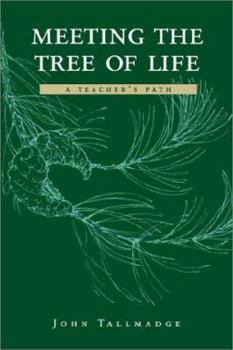Meeting the Tree of Life: A Teacher's Path
Select Format
Select Condition 
Book Overview
No Synopsis Available.
Format:Paperback
Language:English
ISBN:0874805317
ISBN13:9780874805314
Release Date:March 1997
Publisher:University of Utah Press
Length:206 Pages
Weight:0.80 lbs.
Dimensions:0.6" x 6.0" x 9.1"
Customer Reviews
3 ratings
A great book for teachers and students alike...
Published by Thriftbooks.com User , 17 years ago
I read this book for the first time when I was in my last semester of graduate work at Kansas State University. I was about to graduate with an M.A. in English that I had no idea how I was going to use. Tallmadge's autobiographical tale of his struggles with nature, self, career, and others encapsulates perfectly the agonizing dilemma that strikes any teacher with the slightest amount of idealism still in their blood. He wants to be true to himself, to, as Joseph Campbell put it, "follow [his] bliss." But he keeps getting derailed: first by the army, and then by a succession of teaching jobs that seem intent on crushing the budding idealism out of his teaching methodology. While the book is at times a bit overly idealistic and starry-eyed, you can't help but admire the enthusiasm and passion with which Tallmadge tries to instill his passion for nature in his students. He's the kind of teacher that any lover of Emerson, Thoreau, Whitman, or modern writers like Terry Tempest Williams, Leslie Marmon Silko, or the like would immediately take to. He wants his students to understand their connection, not only with the land, but with each other, as a community of learners as well as a community of human beings. And then, at the end, when everything seems to fall apart, he finds solace in the simplest of items: a jack pine cone. I'd say more about that, but I don't want to ruin the moment of revelation that comes at the end. Sufficed to say that "Meeting the Tree of Life" will leave you with a greater appreciation as well as understanding of the complex relationships that exist within nature as well as within the human soul. Like this review the book can be a little overly flowery at times, but the understanding that comes with reading this book makes those moments of saccharine sweetness almost pleasant. Give this book a try and I'm pretty sure you won't be disappointed.
It's a Wonderful Life!
Published by Thriftbooks.com User , 23 years ago
Tallmadge uses the events of his own life to illustrate mankind's connection to the environment and the necessity of wilderness. Writing in the spirit of his admired predecessors, Thoreau, John Muir, Edward Abbey, and Aldo Leopold; Tallmadge attempts to find his own unique voice in the enlightenment of his experience. At times he may get a little too "intimate with the rock", but he leaves the reader an optimistic feeling of the joy of discovery and knowledge.
Wilderness adventure in the nature writing tradition
Published by Thriftbooks.com User , 26 years ago
On-Line Review by Leo Goldman, Natural Resources Defense Council.: In one way, this book is in the tradition of the author's admired nature writers -- such folk as Emerson, Thoreau, John Muir, and Aldo Leopold. But the framework is an autobiography, beginning with brief mention of his childhood in suburbs, which he describes almost as if they were crowded cities, and from which he began to escape at age 15 to backpacking and climbing. A college student during the Vietnam War, he later sought in wilderness "authenticity" and " a model for just and sustainable human societies" -- which he did not see in the world he and his friends had grown up in. He begins the detailed story with a difficult High Sierra climb -- between his military service (having volunteered for a program of Russian studies and intelligence work in order to avoid Vietnam itself) and graduate school. As he seeks for understanding of his motivations and feelings, he speaks first of challenge, thrill, danger, and athletic pleasure, but eventually realizes that he has become a naturalist, appreciating nature in all its complexity, not just the physical challenges and dramatic views. We follow his wilderness explorations, first in the mountains of the southwest during his first three years as a professor in Utah, then his disappointment in leaving the mountains for his next job, in Minnesota. There, however, he develops an appreciation of the wilderness of the flat country, mostly in canoe trips. Certainly an offbeat English professor, he had his students read nature writing, then accompany him on difficult treks to mountains and lakes, and return to write about their experiences. This approach was not appreciated by his colleagues, who apparently preferred traditional methods of teaching literature and writing. He ends this volume with the shock of being denied tenure -- but finds new awareness in the metaphor of a pine cone that releases its new life only in fire.






